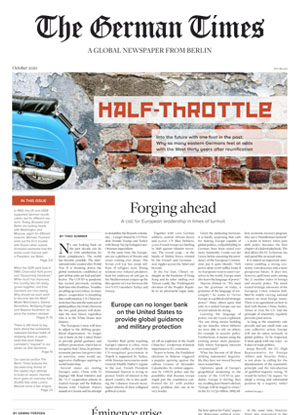Éminence grise
Putin has not yet chosen a course vis-à-vis Belarus, but all signs point to his continued support for Lukashenko
After the disputed presidential election in Belarus on Aug. 9, Vladimir Putin was one of the first to congratulate Alexander Lukashenko on his landslide win. Yet the Russian president was cautious at first, pursuing more of a wait-and-see approach as to which position the Kremlin should take.
“Putin congratulated Lukashenko on his victory, but the tone of his remarks was cool and formal,” noted the Moscow-based sociologist Lev Gudkov. Even Vladimir Zhirinovsky, chair of the right-wing nationalist Liberal Democratic Party of Russia, spoke of “election fraud,” and Aleksey Pushkov, chair of the Duma Foreign Affairs Committee, called it a lost election rather than a victory. Coverage of the protests in Belarus was surprisingly fair and was even debated in Russian state media.
Leaders in Moscow were most certainly surprised that the anti-Lukashenko protests continued peacefully for weeks rather than coming to a quick conclusion. Even as the nation’s security forces used violence in a ruthless attempt to quell the protests, the demonstrations spread across the entire country. Results included strikes at large state-operated companies and a genuinely popular people’s movement against Lukashenko.
This clearly made an impression in Moscow, too, especially since the protests involved no anti-Russian sentiments, in contrast to the situation in Ukraine during the Maidan Uprising of 2014. Indeed, the Belarus opposition took great pains to ensure that the protest did not assume an anti-Russian character.
And yet Lukashenko remains in place as head of state in Belarus. He seems to be waiting out the protests while wearing them down through violent actions by the police. It seems that he can continue to count on the support of his security forces. His centralized power apparatus is showing no tangible cracks, and only a few high-ranking functionaries have withdrawn their allegiance.
Moscow is keeping a close eye on the situation. “Having Lukashenko remain in power is the best option for Putin,” argues the Belarusian political scientist Yauheni Preiherman from the Minsk Dialogue Council on International Relations. He is convinced that “Putin is the kingmaker of the Belarusian political crisis.”
Russia’s president appears to be keeping all of his options open. While Lukashenko refuses to take any phone calls from European politicians such as German Chancellor Angela Merkel and French President Emmanuel Macron, Putin has picked up the phone and signaled his readiness for dialogue. Among the solutions being considered are talks within the framework of the Organization for Security and Co-operation in Europe (OSCE) and a constitutional process in Belarus.
At the same time, however, Putin also announced in late August that he had organized a standby security force that could intervene in Belarus if the situation got out of control. Most experts nevertheless consider military intervention by Moscow to be highly unlikely. For the Kremlin, such a move would involve an incalculable risk of triggering a wave of anti-Russian resentment in Belarus. An invasion would not be welcome.
The foreign policy damage would also be significant and further isolate the Russian leadership on the international stage. Furthermore, an invasion of Belarus wouldn’t earn Putin any points among his own people.
In contrast to the annexation of Crimea in 2014 – a move that was supported by a majority of people in Russia – surveys conducted by the Moscow-based Levada Center showed that only 13 percent of respondents were in favor of incorporating Belarus. “Most of the people surveyed think the relationship with Belarus should stay the way it is.”
The threat of a Russian invasion is presumably being used more as a diversionary tactic in Moscow’s effort to stabilize Lukashenko in less obvious ways and thereby further increase his dependence on the Kremlin. If successful, this approach would make the existing union between Belarus and Russia much stronger – a relationship that has so far been more of an administrative agreement than an actual union of states. In the past several years, Lukashenko has pursued a seesaw policy of resisting Moscow’s insistence on closer ties between the two states while intermittently offering his services to the EU. But now that Lukashenko has been discredited as an election fraudster, the only thing he has left to secure his political survival is his close relationship to Russia.
In this regard, Russian Prime Minister Mikhail Mishustin’s visit to Minsk on Sept. 3 was instructive. The official reason for the visit was to discuss the billions of rubles of debt owed to Russia by Belarus and to conclude an agreement about energy supplies. In the context of Mishustin’ visit, Lukashenko shuffled around a number of high-level security officials.
Ivan Tertel was named the new head of the Belarusian secret service (KGB), replacing Valery Vakulchik. London-based political scientist Mark Galeotti sees Vakulchik’s repeated resistance to interference by Moscow as the reason for his ousting. Galeotti also argues that the switch at the top spot of the secret service was carried out under pressure from Moscow, noting that Tertel likely has a better relationship to the Russian secret service (FSB).
These moves are an indication that the Kremlin is committed to strengthening cooperation on different levels. On one level, Moscow supports Lukashenko’s power apparatus by deploying Russian “consultants” at various key contact points. The impact of this tactic is already felt in Belarusian media; after a number of journalists and technicians were fired, Russian colleagues took over their duties. In the meantime, these “Russian aides” have no doubt been installed in many other fields. Most recently, after hosting Lukashenko for talks at his residence in Sochi on Sept. 14, Putin made an announcement pledging a loan of $1.5 billion to Belarus in response to Lukashenko’s plea that “a friend is in trouble, and I say that sincerely.” Whether Russian aid remains purely monetary is an open question.
The situation in Belarus can change on a daily basis and the country’s future is difficult to predict. If the peaceful protests were to suddenly turn violent, a change in Moscow’s cautious policy is quite possible. People in Minsk are highly concerned that paid provocateurs might actually instigate such a turn of events in the near future.
This article will appear in the printed version of the *German Times* in early October.
Gemma Pörzgen
Gemma Pörzgen is a Berlin-based journalist specializing in Eastern Europe. She is also editor-in-chief of the magazine Ost-West. Europäische Perspektiven (East-West. European Perspectives).




